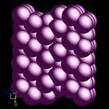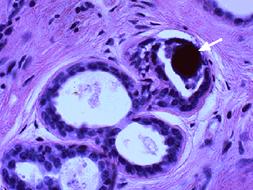The analysis of “National Health and Nutrition Examination Surveys” data of moderate to severe iodine deficiency is present now in a significant proportion of the U.S. population, with a clear increasing trend over the past 20 years, caused by reduced iodized table salt usage.[1] Along with magnesium and selenium, iodine is one of the most deficient minerals in our bodies.
The body’s ability to resist infection and disease is hindered by long-term deficiency in essential vitamins and minerals. Importantly poor immune response is correlated with impaired thyroid function; a deficiency in iodine can greatly affect the immune system because low levels of iodine lead to problems with the thyroid gland.

“In sufficient amounts iodine can not only adjust a dysfunctional thyroid, it can assist with a host of glandular imbalances as well as a wide assortment of internal as well as external bacteria, fungi, and virus’s. Iodine has many non-endocrine biologic effects, including the role it plays in the physiology of the inflammatory response. Iodides increase the movement of granulocytes into areas of inflammation and improve the phagocytosis of bacteria by granulocytes and the ability of granulocytes to kill bacteria.[2]”
Iodine’s ability to revive hormonal sensitivity seems to significantly improve insulin sensitivity. Iodine attaches to insulin receptors and improves glucose metabolism.
Iodine deficiency symptoms include:
- muscle cramps,
- cold hands and feet,
- proneness to weight gain,
- poor memory, constipation,
- depression and headaches,
- edema,
- myalgia,
- weakness,
- dry skin,
- brittle nails.
High doses of iodine have been found to eliminate or decrease the need for insulin in both type one and type two diabetics. This information is available from Dr. Brownstein and is in Dr. Sircus’ Diabetes and Iodine books.
It is very likely that iodine also has an effect on arthritis and other auto immune diseases. It definitely affects thyroid problems too, some of which are also consideered autoimmune diseases.
Iodine and your Heart
According to Dr. Stephen A. Hoption Cann“Iodine deficiency can have deleterious effects on the cardiovascular system, and correspondingly, that a higher iodine intake may benefit cardiovascular function.” Both hypothyroidism and hyperthyroidism have been shown to have negative effects on the heart. Clinical cardiovascular features of hypothyroidism include: bradycardia, reduced cardiac output, increased pericardial and pleural effusions, increased diastolic blood pressure and peripheral vasoconstriction.
Dr. Michael Donaldson says, “Iodine stabilizes the heart rhythm, lowers serum cholesterol, lowers blood pressure, and is known to make the blood thinner as well, judging by longer clotting times seen by clinicians. Iodine is not only good for the cardiovascular system, it is vital.
Iodine, Cancer and Fibrocystic Disease

In my Cancer Compendium book iodine is presented as a vital component for cancer treatment. It is absolutely vital for preventing and curing breast cancer and probably all forms of cancer would be diminished by its concentrated use. Dr. Tullio Simoncini, an oncologist in Rome, famous for his sodium bicarbonate treatments, uses iodine to treat skin cancer.
Several studies have demonstrated a relationship between low iodine intake and fibrocystic disease of the breast (FDB), both in women and laboratory animals. [3] The first thing that happens to a woman when she develops an iodine deficiency is a problem with her reproductive organs: breast deformation, and general calcification.
Iodine supplementation will gradually eliminate the first phase of the cancer development in the breasts (fibrocystic disease) so no new cancers can start. It also will kill abnormal cells floating around in the body at remote sites from the original cancer. This approach appears to work for prostate cancer as prostate cancer is similar to breast cancer in many respects according to Dr. David Derry.
“ Iodine is needed in microgram amounts for the thyroid,mg amounts for breast and other tissues, and can be used therapeutically in gram amounts.[4]” – Dr. David Miller
Sources of Iodine
Sources of iodine include most sea foods, (ocean fish, but not fresh fish, shellfish, especially oysters), unrefined sea salt, kelp and other sea weeds, fish broth, butter, pineapple, artichokes, asparagus, dark green vegetables and eggs. Certain vegetables, such as cabbage and spinach, can block iodine absorption when eaten raw or unfermented and are called goitrogens. But eating fish won’t give you iodine in mg amounts. To get 13.8 mg iodine, you would have to eat 10-20 pounds of fish per day.[5]
The table below lists the iodine content of some iodine-rich foods in micrograms (mcg). Because the iodine content of foods can vary considerably, these values should be considered approximate.
http://lpi.oregonstate.edu/infocenter/minerals/iodine/
|
Food |
Serving |
Iodine (mcg) |
|
Salt (iodized) |
1 gram |
77 |
|
Cod |
3 ounces* |
99 |
|
Shrimp |
3 ounces |
35 |
|
Fish sticks |
2 fish sticks |
35 |
|
Tuna, canned in oil |
3 ounces (1/2 can) |
17 |
|
Milk (cow’s) |
1 cup (8 fluid ounces) |
56 |
|
Egg, boiled |
1 large |
29 |
|
Navy beans, cooked |
1/2 cup |
35 |
|
Potato with peel, baked |
1 medium |
63 |
|
Turkey breast, baked |
3 ounces |
34 |
|
Seaweed |
1 ounce, dried |
Variable; may be greater than 18,000 mcg (18 mg) |
[1] Hollowell JG, Staehling NW, Hannon WH, et al. (1998) Iodine nutrition in the United States. Trends and public health implications: iodine excretion data from National Health and Nutrition Examination Surveys I and III (1971-1974 and 1988-1994). J Clin Endocrinol Metab 83: 3401-3408
[2] Stone OJ (1988) The role of the primitive sea in the natural selection of iodides as a regulating factor in inflammation. Med Hypotheses. 25:125-129
[3] Ghent, W., et al, Can. J. Surg., 36:453-460,1993. Eskin, B., et al, Biological Trace Element Research, 49:9-19, 1995.
[4] The iodine content of most foods depends on the iodine content of the soil in which it was raised. Seafood is rich in iodine because marine animals can concentrate the iodine from seawater. Certain types of seaweed (e.g. wakame) are also very rich in iodine. Processed foods may contain slightly higher levels of iodine due to the addition of iodized salt or food additives, such as calcium iodate and potassium iodate. Dairy products are relatively good sources of iodine because iodine is commonly added to animal feed in the U.S. In the U.K. and northern Europe, iodine levels in dairy products tend to be lower in summer when cattle are allowed to graze in pastures with low soil iodine content .
[5] Iodine Metabolism; http://iodine4health.com/overviews/clinicians/miller_clinician.htm
Dr.Sircus is a reader-supported publication. To receive new posts and support my work, consider becoming a free or paid subscriber.
Subscribe now



comments